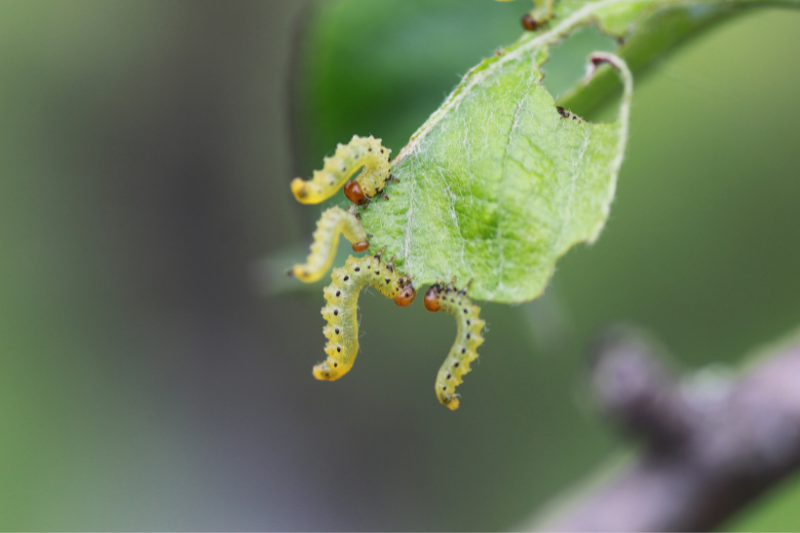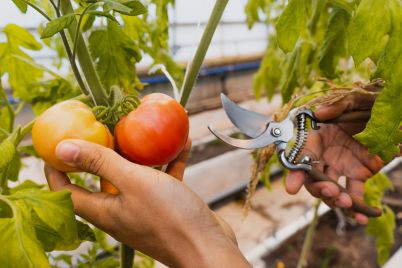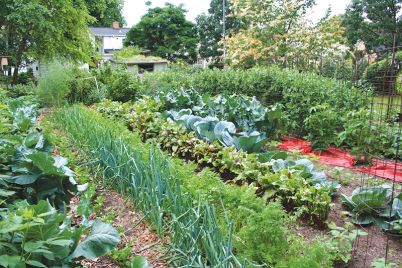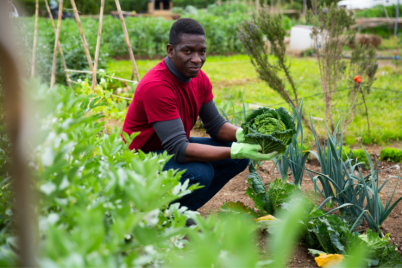Gardening can be such an exciting experience. A positive trifecta: physical exercise, emotional excitement and delicious rewards.
Too frequently, gardening is a disappointing experience. Many new gardeners feel defeated due to the bane of almost every gardener’s existence — insects and the diseases they spread.
There is not enough space here to cover every possible insect dining on our vegetables, but I fight the following daily. (BTW: If you don’t know which insect is destroying your garden try an insect identification app).
Root Knot Nematodes (RKN): RKN love our hot sandy soil, and there are no reliable organic or chemical treatments for home gardens. These roundworms are microscopic but turn otherwise healthy roots into a gnarled mass incapable of transporting nutrients to the plant. Adding organic matter to the soil helps over time. Solarization (described below) helps but takes the bed out of operation.
Food-grade diatomaceous earth (DE) can be added to a new bed but loses effectiveness each time it gets wet. My solution: plant susceptible plants like tomatoes, cowpeas, okra, eggplant, squash, beets, and chard in pots.
Aphids: Aphids are easy but require vigilance and constant treatment. Most insecticides don’t kill eggs, and aphids lay thousands of eggs. Spraying them with a strong shot of water from the hose is effective, as is spraying with Neem or dusting plant leaves with DE. Neither will kill eggs, so these tactics have to be done frequently.
Caterpillars: I use Thuricide BT on a schedule. Do not underestimate how much damage a few tiny caterpillars can do in a short time. Invest in a one-gallon pump sprayer to make this a quick and simple job.
Little Leaf Notchers: These bold, small white beetles have a voracious appetite. You probably have this beetle if you have notches around the edges of plant leaves. They are easy to see but hide quickly. Drop or knock them into a glass of soapy water and discard. Hunt them daily.
Whitefly: Yellow sticky tape is the best solution for whitefly. Hang several around beans and collards. Unfortunately, sticky tape will also trap lizards and other insects.
In your insect battle, don’t forget soil. Insect eggs, fungus, and viruses can be found in soil and plant debris. The following suggestions will help, and with the exception of the drench, only use these tactics after harvest.
- Pour boiling water over the soil: used mostly for pots.
- Soil drenches (using Neem or fungus treatments): pots and any type of bed
- Solarization: any type of bed
We may not be able to fully eradicate disease or destructive insects, but we can discourage both by following some of these general steps:
- Keep your garden weed-free. Weeding a few minutes every day makes the task less daunting. Insects often lay eggs on weeds, and weeds can harbor viruses and fungus. Weeding regularly is a great insecticide.
- Remove dead plant matter from the garden. Viruses and fungus live in plant material, and insects can hide and lay eggs in the debris.
- Discard diseased plants but don’t put them in the compost. Disease can survive there and be re-introduced to garden beds.
- Check garden plant material for insect eggs before composting.
- Check nursery seedlings for insects and signs of disease before purchase.
- Schedule routine insect treatment on your calendar to increase effectiveness. Some insects produce multiple generations in one season, laying thousands of eggs. Many insecticides do not kill eggs. If you see insects, there will also be eggs. Follow the directions for regular treatment.
- Disinfect tools: Fungus and RKN can be introduced to an uninfected bed with garden tools. RNK can survive for months on a tool. You can make your own disinfectant with a 1:10 ratio of bleach to water.
- Solarizing soil will kill everything in the soil. Wet the bed and cover with clear plastic weighted at the sides to keep the plastic in place. This requires at least six weeks and will need to be done periodically.
Healthy plants can generally hold off attacks until they become stressed from a prolonged attack or environmental factors like poor soil and too much or too little water. To help keep your garden healthy: add organic matter like compost to your garden beds monthly; inspect plants daily; create a treatment schedule; discard diseased plants, and keep garden beds and tools clean.
PLEASE NOTE: The Florida Agriculture Department has issued quarantines in our immediate area for the following destructive plant pests: Oriental Fruit Fly in St Petersburg and Giant African Snail in Pasco County.
Happy Gardening!
 Real estate agent Joyce Woodson loves gardening and sharing what she knows. The founder of “Straw Hat Gardening,” she has taught classes on basic organic gardening and provided garden consultations. To reach Joyce, email gardening@joycewoodson.net.
Real estate agent Joyce Woodson loves gardening and sharing what she knows. The founder of “Straw Hat Gardening,” she has taught classes on basic organic gardening and provided garden consultations. To reach Joyce, email gardening@joycewoodson.net.








